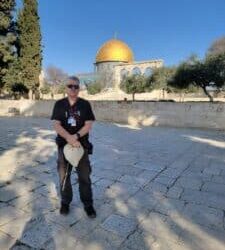Perhaps the most well-known difference between the Jehovah’s Witnesses’ doctrinally slanted “New World Translation” of the Bible and reliable, scholarly translations (such as the NASB, ESV, KJV, etc.) is John 1:1. Christians have used this verse for centuries to defend the deity of Christ and the Trinity but the NWT has changed the wording in one small but crucial way which radically alters the verse’s meaning. Virtually every English Bible ever produced by any translator or committee in any era all read:
“In the beginning was the Word, and the Word was with God, and the Word was God,” (John 1:1).
However, the Watchtower Society (the governing body of the Jehovah’s Witnesses) has changed the very end of the verse, so that it reads:
“In the beginning was the Word, and the Word was with God, and the Word was a god,” (John 1:1, NWT).
By saying that Jesus is not “God” but rather merely “a god,” Jehovah’s Witnesses believe they can justify their diminished view of who Jesus is. It’s fairly easy to show through the Greek wording and grammar and the biblical and cultural background that the JW’s translation is erroneous. However, since the majority of Christians and Jehovah’s Witnesses do not read biblical Greek nor know details about ancient Jewish culture, it can be helpful to show that traditional Bibles are correct. This can be shown through the English text of the faulty “New World Translation” itself!
The Uncreated Creator in John 1:1
Looking just at the wording of the New World Translation, what do we see about Jesus? Let’s take a look at the verse again:
“In the beginning was the Word, and the Word was with God, and the Word was a god,” (John 1:1, NWT).
Even if we pretend, just for the sake of argument, that this could be an accurate translation, it leaves us with more questions than answers. If the Word is a god, which god is the Word supposed to be? And what sort of god? By itself, this clause does not tell us. But the verse as a whole gives us an important clue. Instead of the final words, look at the opening words: “In the beginning was the Word.” It does not say, “In the beginning the Word came into being” or “In the beginning God created the Word.” It says that in the beginning the Word already “was.” In the beginning, the Word is already there. The Word does not have a beginning. Rather, the Word is already present in the beginning. Such a phrase implies an uncreated being. If someone were to say “In the beginning was Jehovah,” such a phrase would not imply that Jehovah was a created being. It would point to the exact opposite of that. So, too, when such a phrase is applied to the Word.
Notice what the passage says immediately afterward:
“This one was in the beginning with God,” (John 1:2, NWT).
In the same way that God “was” in the beginning, so too the Word “was” in the beginning. Driving the point home, the next verse explains:
“All things came into existence through him, and apart from him not even one thing came into existence,” (John 1:3, NWT).
Note that all things came into existence through Him. Indeed, not even one thing came into existence except through Him. If The Word were Himself a creation, this would be utter nonsense! He could not come into existence through Himself. If He came into existence, He would be one thing that came into existence that did not come into existence through the Word. But the verse here is emphatic: not even one thing came into existence apart from Him. When we ask which god the Word is, we must say that He is the eternal, uncreated creator. He is the God who brought all things into being and who Himself had no beginning. How many gods meet that description?
The God of Israel
As we continue reading in the passage, we find that it also says of the Word:
“He came to his own home, but his own people did not accept him,” (John 1:11, NWT).
To whom did “The Word” (i.e., Jesus) come? Who were His own people that did not accept Him? They were the Jewish people, of course. Jesus is the God whose people are the Jews. How many gods are there that can claim the Jewish people as their own people? Only one. The Jews had but one God. Jehovah did not share His covenant people with some other lesser god. No other god could call them “his own people.” So, if Jesus is “a god.” Which god? He is the uncreated creator whose own people were the Jews. Jesus is Jehovah.
Pouring Out the Holy Spirit
As we continue reading the chapter, we are told of the prophet John and his testimony about Jesus.
“Even I did not know him, but the very One who sent me to baptize in water said to me: ‘Whoever it is upon whom you see the spirit coming down and remaining, this is the one who baptizes in holy spirit,’” (John 1:33, NWT).
Jesus is the one who baptizes in the Holy Spirit. But who is that, exactly? What is that supposed to tell us? And it is not only here that John the Baptist tells us this but John also says this same thing about Jesus in all of the other gospels as well!
“I baptized you with water, but he will baptize you with the holy spirit,” (Mark 1:8 NWT, see also Matthew 3:11 and Luke 3:16).
Jesus reaffirms the point Himself just before ascending into heaven, and He makes it clear that it was fulfilled when the Spirit was poured out on the Apostles and early Christians just after that time:
“for John, indeed, baptized with water, but you will be baptized with the holy spirit not many days after this,” (Acts 1:5, NWT).
Why is it so important to know that Jesus is the one who was to pour out the Holy Spirit? Peter explains this in Acts chapter 2:
“These people are, in fact, not drunk, as you suppose, for it is the third hour of the day. On the contrary, this is what was said through the prophet Joel ‘And in the last days,’ God says, ‘I will pour out some of my spirit on every sort of flesh, and your sons and your daughters will prophesy and your young men will see visions and your old men will dream dreams,'” (Acts 2:15-17, NWT).
When Jesus poured out the Spirit on His followers, He was fulfilling an Old Testament prophecy where God promised to pour out the Holy Spirit on His people. So, Jesus did something that God Himself had promised to do. Who is the one who was to pour out the Holy Spirit? God was! And which God? Let’s look at Joel’s prophecy and see:
“And you will have to know that I am in the midst of Israel And that I am Jehovah your God—there is no other! My people will never again be put to shame. After that I will pour out my spirit on every sort of flesh, And your sons and your daughters will prophesy, Your old men will dream dreams, And your young men will see visions,” (Joel 2:27-28, NWT).
It is not merely some generic god speaking here, it is Jehovah by name. He explicitly says that there is no other God and then says that He will pour out the Spirit on all flesh. So, Jesus is the one who was supposed to pour out the Spirit. The one who was supposed to pour out the Spirit was Jehovah God Himself. Therefore, Jesus is Jehovah God.
The True and Living God
The typical JW response to this is not to directly address any of these passages but rather to run elsewhere, quite often to John 17, where they read:
“This means everlasting life, their coming to know you, the only true God, and the one whom you sent, Jesus Christ,” (John 17:3, NWT).
The argument is that John 1 cannot be saying that Jesus is God because John 17 says that the Father is the “only true God.” This objection is based on faulty logic and ignorance about the doctrine of the Trinity, and is fully addressed in our article: John 17:3, “The Only True God”. But it is also worth noting that this verse presents the Jehovah’s Witnesses with another serious problem. You see, their translation of John 1:1 acknowledges that Jesus is a god. Their translation of John 17:3 is clear that there is only one true god. Therefore, all other gods are false gods. So which is Jesus? If He is a god, He is either the one true God or He is a false god. John 1:1 is obviously not calling Jesus a false god. Thus, John 17:3, taken in context with the whole gospel, is actually supportive of the Trinitarian conclusion that Jesus, though personally distinct from the Father, is nevertheless the same God. God the Father and God the Son are both the one true God, Jehovah! We can see this same point elsewhere. For example, Jeremiah says:
“But Jehovah is truly God. He is the living God and the eternal King. Because of his indignation the earth will quake, And no nations will endure his denunciation. This is what you should say to them: ‘The gods that did not make the heavens and the earth Will perish from the earth and from under these heavens,’” (Jeremiah 10:10-11, NWT)
Two important things to note here. Jehovah alone is the “living God.” Jehovah is not merely one of the living gods. He is the living God. There is no other. So is Jesus a lifeless god? Is He a dead idol? Absolutely not! John’s gospel again tells us:
“by means of him was life, and the life was the light of men,” (John 1:4, NWT).
And:
“Jesus said to her: ‘I am the resurrection and the life. The one who exercises faith in me, even though he dies, will come to life,” (John 11:25, NWT).
And again:
“Jesus said to him: ‘I am the way and the truth and the life. No one comes to the Father except through me,” (John 14:6, NWT).
Jesus is life and the giver of life. He is not a dead god. He is the living God! What’s more, Jeremiah also said that the gods that did not make the heavens and earth would perish from the earth. If Jesus is not the creator God, then He is among the gods whom Jehovah has promised to destroy. Yet, even the Jehovah’s Witnesses would agree that Jehovah is not planning to destroy Jesus. Jesus, as a god, will reign over the earth forever. Thus, Jesus is not among the other gods. Jesus is the true and living God. Jesus is Jehovah.
Conclusion: John 1:1 Refutes JWs Even in the NWT
Having seen that Jesus is clearly and repeatedly identified as Jehovah, even within the very chapter where John 1:1 occurs, it becomes quite clear that John was not identifying Jesus as some kind of lesser deity. The Word was not merely “a god.” The Word was God. Thus, it is apparent that the New World Translation is incorrect in its rendering of John 1:1. The traditional reading is, in fact, correct. Ironically, we can see evidence of this even within the pages of the New World Translation itself.





